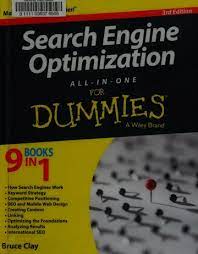
Welcome to the world of Search Engine Optimization (SEO)! If you’re new to the concept, don’t worry – we’ve got you covered. SEO is the practice of optimizing your website to rank higher in search engine results pages, ultimately driving more organic traffic to your site.
One of the fundamental aspects of SEO is keyword research. Keywords are the phrases that users type into search engines when looking for information. By strategically incorporating relevant keywords into your website content, you can improve your chances of ranking higher in search results.
Creating high-quality, engaging content is essential for SEO success. Make sure your content is relevant to your target audience and includes relevant keywords naturally throughout. Additionally, optimizing meta tags, headings, and image alt text can further boost your SEO efforts.
Backlinks are links from other websites that point to your site. Search engines view backlinks as a vote of confidence in your content. Focus on building quality backlinks from reputable sites within your industry to improve your site’s authority and rankings.
SEO is an ongoing process that requires monitoring and adaptation. Use tools like Google Analytics to track your website’s performance and make adjustments as needed. Stay informed about algorithm updates and best practices to ensure long-term SEO success.
By following these basic principles of SEO, even beginners can start improving their website’s visibility and attracting more organic traffic. Remember, SEO is a journey – so stay patient, persistent, and proactive in optimizing your online presence!
Selecting appropriate keywords for your content is a crucial aspect of effective search engine optimization. By choosing relevant keywords that align with the intent of your target audience, you can significantly improve your website’s visibility in search engine results. Incorporating these keywords naturally into your content helps search engines understand the relevance of your pages, ultimately driving more organic traffic to your site. Remember, thoughtful keyword selection is key to enhancing your SEO efforts and connecting with the right audience online.
One crucial tip for beginners diving into Search Engine Optimization is to optimize your website’s meta tags, titles, and descriptions. These elements play a vital role in helping search engines understand the content and relevance of your web pages. By strategically incorporating relevant keywords and crafting compelling meta tags, titles, and descriptions, you can significantly improve your site’s visibility in search engine results pages. This simple yet effective practice can make a substantial difference in attracting organic traffic to your website and boosting your overall SEO performance.
Creating high-quality and engaging content regularly is a crucial tip for mastering Search Engine Optimization (SEO). By consistently producing valuable and relevant content that resonates with your target audience, you not only establish credibility and authority in your industry but also increase the likelihood of ranking higher in search engine results. Engaging content keeps visitors on your site longer, reduces bounce rates, and encourages social sharing – all factors that search engines consider when determining rankings. Remember, quality content is the cornerstone of a successful SEO strategy that drives organic traffic and boosts online visibility.
Improving your website’s loading speed is a crucial tip for enhancing search engine optimization, especially for beginners. A faster loading website not only provides a better user experience but also positively impacts your site’s search engine rankings. Search engines like Google prioritize websites that load quickly because they understand the importance of delivering a seamless browsing experience to users. By optimizing your website’s loading speed, you not only cater to user expectations but also signal to search engines that your site is well-maintained and user-friendly, ultimately boosting your SEO efforts.
Internal linking is a valuable strategy in Search Engine Optimization for beginners. By strategically linking related content within your website, you not only improve the user experience by guiding visitors to relevant information but also help search engines understand the structure and relevance of your site. This practice can enhance your site’s overall authority, increase time spent on your website, and ultimately boost your SEO rankings. Remember, effective internal linking is a simple yet powerful way to optimize your website for both users and search engines.
When it comes to optimizing images for better search engine visibility, using descriptive file names and alt text is crucial. By naming your image files with relevant keywords that describe the content of the image, you can help search engines understand what the image is about. Additionally, providing alt text that accurately describes the image not only improves accessibility for visually impaired users but also gives search engines more context about your content. This simple yet effective practice can significantly enhance your website’s SEO efforts and improve overall user experience.
Ensuring that your website is mobile-friendly and responsive is a crucial aspect of effective Search Engine Optimization (SEO). With the increasing number of users accessing the internet through mobile devices, search engines prioritize mobile-optimized sites in their rankings. By providing a seamless and user-friendly experience across all devices, you not only improve your chances of ranking higher in search results but also enhance user engagement and satisfaction. Investing in a mobile-responsive design is key to reaching a wider audience and staying competitive in the digital landscape.
To effectively track and enhance your search engine optimization efforts, it is crucial to monitor your SEO performance using tools such as Google Analytics. By leveraging this powerful tool, you can gain valuable insights into key metrics like website traffic, user behavior, and conversion rates. Analyzing this data allows you to identify areas for improvement, track the success of your SEO strategies, and make informed decisions to optimize your online presence for better search engine rankings. Monitoring your SEO performance with tools like Google Analytics is a fundamental step towards achieving long-term success in the competitive digital landscape.